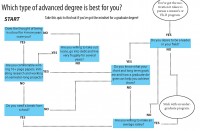In the twenty-first century, the norm doesn’t cut it. Everywhere you look, scholars and artists seem to be pushing the boundaries of their abilities. In past decades, high school students have gone to college in order to attain a bachelor’s degree. In effect, they’ve hoped to achieve success in their future careers and endeavors. A bachelor’s guaranteed a job and secured a pretty hefty salary.
But now, many students and educators are left wondering whether a bachelor’s degree is enough anymore. Nearly 90,000 students graduate from college every year. If half of those students graduate with a bachelor’s degree, the competition within the job world intensifies greatly. Graduates without any prior experience (internships, job experience etc.) have a decreased chance of acquiring a well paying job; members of the workforce who never attained a degree are at an even higher disadvantage.
According to Debra W. Stewart, president of the Council of Graduate Schools, the master’s in the new bachelor’s. Today, about the same amount of people (2 in 25) have a master’s degree that in 1960, held a bachelor’s degree or higher.
That statistic alone begs the question: Is getting only a bachelor’s degree enough to be successful anymore?
‘’There is definitely some devaluing of the college degree going on,’’ said Eric A. Hanushek, an education economist at the Hoover Institution, in a 2011 New York Times article by Laura Pappano.
Hanushek believes that having a college degree sometimes isn’t an adequate screening of achievement for employers anymore. A master’s or Ph.D. might guarantee more experience and more years.
The type is there. Look through the pages of the classified section or on monster.com and you might see “Bachelor’s required”, but also “Master’s preferred”.
High school students have seen the transition coming for a while. Those that have thought about their lives after college know that the real world is tough.
“I’m thinking about getting my master’s in computer sciences,” said Omar Solis, a senior who will attend Columbia College in the fall. “It means more money, more opportunities, and it looks better on a resume.”
But does having a master’s automatically guarantee a job with more prestige? An extra couple of years at school will most likely rack up a hefty student loan–a fact difficult to look past.
There are still master’s degrees, such as degrees in education and social sciences, which yield little bearing in other capacities.
“In some fields, such as business or engineering, a graduate degree typically boosted income by more than enough to justify the cost,” said Liz Pulliam Weston, finance writer for the L.A. Times. “In others — the liberal arts and social sciences, in particular — master’s degrees didn’t appear to produce much if any earnings advantage.”
Although the road to receiving a Masters degree or a Ph.D takes a considerably larger amount of time and money, it is important to bear in mind that four years of university does not possess the same worth it did years ago. During the trying economic times American families are enduring, an advanced education is an extremely critical investment that truly does pay off.
Bachelor’s required, master’s preferred: An undergraduate degree just isn’t enough to secure a job out of college in the 21st century
Kirsten Markusic, Staff Reporter
April 5, 2012

